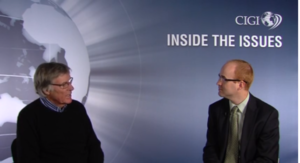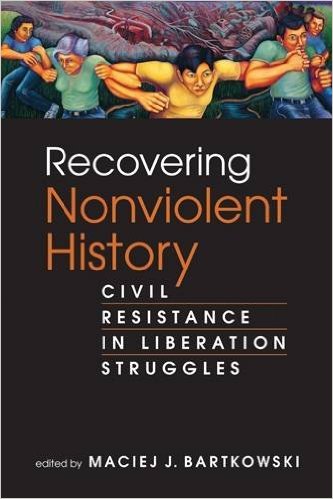I have recently had a pleasure of joining Ambassador Jeremy Kinsman on stage at Ryerson University to discuss civil resistance, democratic transitions and the role of diplomats in assisting nonviolent movements. Those who have not had a chance to participate in the meeting can now view the Centre for International Governance and Innovation’s podcast “Inside the Issues” where Amb. Kinsman discusses the third edition of A Diplomat’s Handbook for Democracy Development Support. He eloquently explains there why and how the international community, including diplomats must and can work with the mobilized societies of non-democracies.
In the interview Kinsman emphasizes a growing phenomenon of ordinary people from all over the world “demanding greater agency over the decisions” that affect their daily life. The Arab Spring was a vivid illustration of the agency in action. According to Kinsman the urge for people to attain agency suggests that a traditional focus of the international efforts on fixing “processes”, e.g. setting up an election infrastructure or building institutional capacities of government agencies has to be reassessed in favor of developing new tools that the international community could use to work more effectively with activists and nonviolent organizers around the world.
Although democracies cannot be imposed from above Kinsman sees an important role for diplomats in assisting nonviolent pro-democracy movements. Formally, diplomats have been accredited to the authorities of the host countries that historically encapsulated the idea of the state-to-state relations. However, in today’s practice, diplomats from democracies should represent their own societies to the societies of the host countries. In essence, diplomats today must advance the ideas of a public diplomacy that pays attention to the values, interests, thinking and aspirations of the ordinary people and not the elites.
It is necessary for diplomats from democracies to strive to reconcile their societal values with more instrumental political or economic interests of their state. Kinsman offers a useful example for how that reconciliation can look in practice. The strategic partnerships with China and Russia that democracies are striving to develop do not permit the latter to tell the former what they can or cannot do with their citizens and how they can or cannot run their internal affairs. However, the democracies can and must stress that any strategic partnership is also driven by the reactions of their citizens to the abuses that the Chinese and Russian citizens are subject to. A diplomat faces the pressure of his/her own democratic society that insists that its diplomatic representative cannot be silent when human rights are violated. Furthermore, as Kinsman observers, diplomats and their societies have to repeatedly ask the governments of non-democracies about how their behavior towards human rights defenders reconcile with the letter and spirit of the international covenants that these governments voluntarily signed on and thus agreed to a certain human rights-oriented code of conduct.
 Kinsman also mentions the International Center on Nonviolent Conflict where I work while discussing the important findings on civil resistance that shows that nonviolent movements are 2,5 times more effective in reaching their political objectives as well as bring about more quickly a resolution to a conflict than their violent counterparts. Nonviolent resistance also “incubates all of the features of capacity building, empowerment, tolerance, inclusivity, pluralism that will be necessary the morning after [when the dictator is gone]” – he goes on. Violence naturally cannot deliver this propitious-for-democracy experience.
Kinsman also mentions the International Center on Nonviolent Conflict where I work while discussing the important findings on civil resistance that shows that nonviolent movements are 2,5 times more effective in reaching their political objectives as well as bring about more quickly a resolution to a conflict than their violent counterparts. Nonviolent resistance also “incubates all of the features of capacity building, empowerment, tolerance, inclusivity, pluralism that will be necessary the morning after [when the dictator is gone]” – he goes on. Violence naturally cannot deliver this propitious-for-democracy experience.
The third edition of A Diplomat’s Handbook updates the existing and introduces several new case studies, among others, Zambia, Tunisia, Egypt, Russia, Cuba, China that offers variety of examples of how diplomats have worked with nonviolent activists. Since- as Kinsman argues – “no two situations are the same” and “each country’s trajectory toward democracy is sui generis” it is imperative to learn from individual cases. At the same time, this learning informs the content of the diplomats’ “toolbox” that they as well as other external actors can use to work more effectively with mobilized citizenries around the world.
Kinsman concludes with an important observation that the effectiveness of diplomats while working with the civil society of the host country depends on the quality of their own democracy at home. One cannot talk authentically about inclusivity and pluralism if these values are not practiced or are practiced badly at diplomat’s home country. Public diplomacy is an “exemplary” undertaking, according to Kinsman, whereby domestic actions of a civil society to perfect its democratic practices bear on the scope and quality of what its diplomats can push for vis-à-vis non-democracies and their societies.




Recent Comments